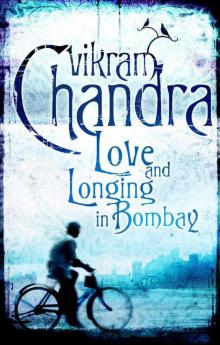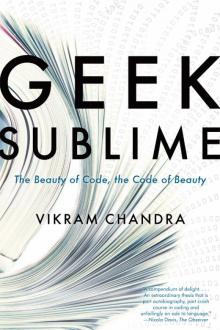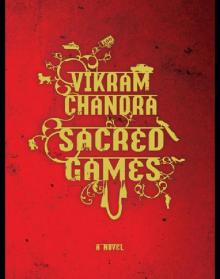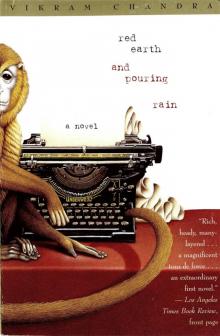- Home
- Vikram Chandra
Red Earth and Pouring Rain Page 13
Red Earth and Pouring Rain Read online
Page 13
Making love with her was like dancing; there was the same attention to choreography, to positions illustrated in brilliant colours in old palm-leaf books (the whole body used without shame), to technique that lasted for moments and minutes and hours of controlled breathing and formalized caresses, lost finally in the last blinding clutching heaves and the quietness afterwards; love was not merely love, it was something else always, a hidden language for a greater secret, and coming with her he felt a vanishing, a flowing that stretched from his tip buried inside her, back through the groin and up into his belly, his diaphragm, his heart. They made love every night, through the long dry winter, waking in the morning to find the marble patio outside the room strewn with rose petals; it began to grow warm, and one evening they sat cross-legged, face-to-face, joined, covered with a glistening sheen of perspiration, his hands tracing her spine. Her tongue flickered over his face, over the contours of his ears, around his nostrils. ‘Marry me,’ he gasped, ‘marry me.’
She laughed, throwing back her head, and said: ‘Find your own kingdom, this one is mine.’ She laughed again, and he felt his face flush, his neck tense; he rose on his knees, pushing her to the ground, pushing with arched toes against the ground, his hands tangled in her hair, trying to hurt her, but she squirmed under him, flexing invisibly, and pleasure spread up his spine; she turned her head and bit at his wrist, then struck him in the small of the back with a clenched fist, stinging but not hurting, then again, along the flank, with a cupped hand, carefully controlled; they rolled across the room —sometimes her on top, thrusting, sometimes him —leaving a trail of moisture on the sheets and on the floor. When they lay still, side by side, panting, she touched a curved nail-mark on his thigh, a scratch, and said: ‘Half-moon’; touching a reddish mark like an irregular circle, made with the teeth, on the soft underside of her breast, she said: ‘Broken cloud’; he looked at her blankly, mouth slack, and she shook her head affectionately: ‘O Jangli, didn’t you learn anything in that jungle?’
‘Are you really a witch?’ he said, his anger gone. ‘The Witch of Sardhana?’
She smiled, her pupils expanding like black moons until they filled the corneas, and the lamps in the room flared up, the leaves and petals outside swirled up, forming a momentary curtain of red and green behind the windows; he smiled uncertainly, then said: ‘Whatever you are, you should get married. A widow alone in a place like this, is temptation to a thousand freebooters.’
‘I must have a king, must I?’
‘It would be safer.’
‘Perhaps you’re right; it might hold them off, and why ask for trouble? Who shall it be? A firangi, for survival’s sake, because I know the thing that moves at our doors, I alone.’
‘What do you mean?’
‘Reinhardt, I think it shall be, if it must be.’
‘Him? Him?’
‘Who else? You’ll do for a lover, but if I must have a foreign king, let it be him,’ she said. He spluttered for a moment, insulted, but he thought of Reinhardt, of the Sombre (or in the Hindustani soldiers’ twisted version of the English word, the Sumroo), grown thin and pale because of the infinite eons of creation, because of the unspeakable age of Hindustan and the burden of unending time, and, looking at her, at her breasts and her thighs, still wet from both of them, he understood how it would work, and saw the justice, the completeness, the complementary nature of it. He laughed, bent over and ran his tongue over the mark on her breast, down the crease below, where the flesh rose up from the chest, into her armpit, and they made love, slowly. ‘Yes, I think I will,’ she laughed, ‘yes, I will become the Begum Sumroo.’
now
‘YOUR TIME’S NOT UP YET, MONKEY,’ Yama said. ‘Five minutes.’
He was always a stickler for the letter of the law, and the spirit be damned. This is why a visit to any babu’s office in this land is like a little taste of death. So I made a place for Abhay at the typewriter and motioned at him to sit.
‘What, me?’ he said. ‘I’m not ready yet. No, really, I’m not.’
‘Somebody must have a story,’ Hanuman said.
I looked around wildly. Ashok and Mrinalini were sitting next to each other. ‘A matter of a few minutes,’ I typed. ‘Most urgent. Anything will do: the conditions must be fulfilled.’
‘But us?’ Ashok said.
‘We don’t have a tale to tell,’ Mrinalini said.
‘Of course they do,’ Ganesha said. ‘They’re teachers. Tell them to tell the big story.’
‘Which big story?’ Ashok said, peering over my shoulder.
‘Our story, of course,’ Ganesha said. ‘What really happened.’
What Really Happened.
LISTEN…
This is a what-really-happened, a remaking of the past, a reconstruction of the things that live on within us as they might have happened once upon a time. Suppose someone says, what really happened? Then say that once there were people who built cities in the valley of the Indus, large teeming cities with broad straight streets intersecting at ninety degrees, like a well-made grid. There are some things that have appeared out of the drifting sands to speak cryptically about these people; there is a statue of a sophisticated, gentle man with contemplative, inward-looking eyes. There is a figurine of a dancing girl, head proudly thrown back, hips carelessly and confidently thrust forward, hand on waist, ready to break impulsively into movement. There are thousands of lines of beautiful undecipherable writing on clay seals; on one of these seals Pashupati sits in meditation, the supreme Yogi, the Lord of animals, the wild king of the forest who holds the universe together with his dance, penis erect in gathered energy. There is the figure of the bull, dewlapped and powerful, repeated endlessly on the seals. There are the toys, the thousands of clay animals and carts like the ones we see on country roads today. There are the great baths, now empty; the wind shifts dust endlessly across the desert.
Where did this richness go? Is it true that a tribe riding chariots appeared out of the western passes, filled with the uncouth strength of the steppes, worshipping a rain-god soon to be called the Destroyer of Cities? Were there massacres and raids and despair? Or did the river change course and leave the long streets empty and silent? Or did the cities just grow old, very, very old, and collapse in on themselves like a stand of dying trees? Nobody knows, but we do know that Shiva still meditates endlessly among the awe-struck animals, that the legends of the chariot-riding Aryans speak of old dark-skinned Asuras, who imparted knowledge of secret sciences to chosen students, that brave adventurers fell in love with the daughters of their enemies, the ones from before, the ones who worshipped old gods, that the sounds of the languages of the south seem to fit the strokes of that undecipherable writing, that Urvashi and Menaka and the other Apsaras of Indra’s heaven dance in ancient rhythms, hands curving in old, old gestures that hold oceans of meaning, that bulls stride pulsing with strength across landscapes imagined and invented aeons later, that thousands bathe and then sit in meditation every morning in Bombay and Calcutta and Madras and Delhi, calmly observing the breath, gathering energy.
What really happened? Suppose somebody says, what really happened? Say that Kala walks among us, in all our cities and villages and fields, awaiting his chance, patient, unnoticed and always triumphant; when he wins, finally, only names are lost, only names drift away, dry and hollow, to break up and mingle with sand, but something else is left that lives, that meditates and dances and walks. Say that the wheel turns. But say that there are things that even Kala cannot touch.
The Aryans moved west and south, clearing forests for their cattle, and Indra the thunder-god became Indra the Destroyer of Cities. But, though cities are often destroyed, sometimes they do not vanish, sometimes they become invisible and invade the hearts and minds of the destroyers, who then live forever changed.
So the newcomers and the old ones collided and metamorphosed into a thing wholly new and unutterably old, fell into new orbits around new centres of gravity. In this anomy,
the ones newly in power quickly created a perception that promised order, flung out that oldest and most fundamental of definitive statements at the world: I and you, us and them, what I am and what I am not, white and black. More importantly, there was another perception, or rather an experience of some kind of truth, being born in lonely forest meditations, in the mathematical and musical rhythms of great sacrifices, or perhaps in the heightened awareness of the hunt, this: the universe is one, there is a unity that is the boundless mother of the world of this and not this, and this great harmony, this oneness, this Brahman, bursts into being as differentiation, is visible only by becoming non-unity, so that —Are you ready? Here it comes —unity is diversity, diversity is unity. And this diversity, every part of it, is sacred, because it is one —the sky and the fields, the summer and the rains, life feeding on life, the birds and the animals, each a part of some web: ‘Everything is the eater and the eaten.’
So, it seemed, people must be different, and a story was told: human beings were born when Purusha, the primeval human, was dismembered in a great sacrifice; from his head were born the Brahmins, the scholars; from his arms, the Kshatriyas, the warriors; from his thighs, the Vaishyas, the farmers; from his feet, the Sudras, the labourers; and each had a different part to play, a different role in Leela, the great cosmic play; from each, it might be said, according to his ability, and to each, at least in principle, according to his need.
So the Brahmins made sacrifices and wrote hymns and the Kshatriyas fought wars, and the Vaishyas and the Sudras went about their tilling and labouring. Huge herds were seen in the fields, and cities of wood were built, shining cities with gardens and lovers and good houses. The years passed, then centuries, and the words of the ancient seers, those discoveries made in solitude, were compiled in the Vedas in the shape of formulae, of verse that reveals little to the uninitiated but nevertheless stirs the heart, because the power of the goddess Vac —speech —is immeasurable; it was she who brought forth both the seen and unseen from potentiality, the external from the immanent. The Vedas show little, and tell much. Those who can see will see. Sacred knowledge in the hands of fools destroys.
now
THE WIND moved through the branches of the peepul tree. I was sitting on the roof in the darkness, watching the moon move across the sleeping city. In that light it was possible to imagine that I was back among the roof-tops of my childhood. Yama had gone in his usual manner, disappearing as he bowed from his corner in the moment that Ashok and Mrinalini had finished their story. Sleep, sleep well, Hanuman had said, but I was still awake, and the story still turned within me, making itself.
‘What comes after death?’
I turned and saw Abhay’s face, his eyes hidden in shadow. I was not the only one unable to sleep. I looked around for something to write with, and Abhay held out a piece of paper and pen to me.
‘After death?’ I wrote (wondering at the smooth glide of the strange metal pen over the paper). ‘Why, this, all this: life again.’
As he held the paper up to the moonlight I looked down at the pen, and clicked the knob on top back and forth. I was fascinated still, you see, by the smallest pieces of technology in this new world. Abhay watched me, finally with a very small smile on his face.
‘Life after death,’ he said. ‘I never believed in that. Didn’t sound reasonable. Always thought it was a local superstition.’
‘What superstition is more local than reason?’
He laughed and sat down slowly beside me.
‘But what do you remember?’
‘About death? The sound of rushing water, and darkness.’
‘And after that?’
‘Life again.’
‘Always life,’ he said.
‘Always.’ But then I had a question for him, and sitting through the night he told me of the life of this terrible century, the hundred years of hope and terror I had escaped in my flight from humanity and myself. Past midnight and through the dawn I heard it all, reluctant and trembling but listening still as the sun rose and brought a new day upon us.
So I began to try and catch up. Abhay brought me books from the bazaar and the library, and when I asked Saira about the cinema (wondrous invention!) she said, ‘No problem,’ and took charge of my education. That same afternoon a video-player was installed in the room downstairs, and a stack of tapes arrived from the Kapoor Universal Video Centre down the street. And then of course the arguments started: it turned out that Yama was an enthusiast of the art cinema, while Ganesha was a fan of Manmohan Desai. There was some lively back-and-forth that first day, and after fidgeting through Aparajito, Ganesha whispered in my ear, glaring at Yama, ‘That’s the trouble with these arriviste pseudo-intellectuals. Not only are they so irritatingly sincere in their good intentions, they insist on boring the rest of us.’
Hanuman stretched, twitched his ears, and grinned at me. ‘O wise one,’ he said. ‘Then what in your opinion is a good story?’
‘What it’s always been, monkey,’ Ganesha said. ‘One dhansu conflict. Some chaka-chak song and dance. Grief. Love. Love for the lover, love for the mother. Love for the land. Comedy. Terror. One tremendous villain whom we must love also. All the elements properly balanced and mixed together, item after item, like a perfect meal with a dance of tastes. There you have it.’
And so in the time left to us before the hour of story-telling we watched Amar Akbar Anthony, and a fine feast it was; replete and nourished, I leapt up to my typewriter, and typed, and laughed as the words echoed over the growing crowd on the maidan: ‘All right, all right, bring them on, it’s time for the brothers to be born.’
Ram Mohan Ties a Knot, and Sikander Is Born.
IN THE SPRING Zeb-ul-Nissa married Reinhardt the Sombre, but a week before the wedding, which was celebrated with fireworks and dances, George Thomas rode to the south alone. He had lost, he had been defeated, but he was oddly free of bitterness; he felt, in fact, a surge of freedom that seemed to find amplification in the plunging rhythm of the horse and even in the Holi bonfires that bloomed over the plains. As they had said good-bye in the meeting of seasons, the soon-to-be Begum Sumroo had told him about the fires of spring that celebrated the death of Holika, who had stepped into flames in response to a challenge from a holy man, and had been speedily immolated; the Begum smiled as she told the story, but Thomas had seen the flesh pooling and cindering, stripping away from clean white bone, and shivered.
‘But, Thomas Sahib, or Jahaj Jung, I should say,’ the Begum said, ‘in the evening there are the fires marking her immolation, and when the morning comes, there is the throwing of coloured powders at each other, the drinking of bhang, singing of ribald ballads, teasing, cajolery, a harvest and then a planting. The one cannot be without the other; ask any village dotard and he will gravely scratch his beard, try to look wise and tell you this, and probably ask for money after.’
Nevertheless, at the beginning, as Thomas meandered he stayed away from the villages and towns, from the flickering red dots; later, when the celebrations were over and he ventured into settlements and camps, looking for service, because of his long dark hair, his sunburnt skin and his equipage —which included a ten-foot lance —he was taken for a Pathan, or a Persian, or sometimes even a Turk. On the road, in way-side serais and by wells, he heard the story of his encounter with the Witch of Sardhana, a hundred garbled versions of the affair in which the great Jahaj Jung always emerged the loser to Reinhardt the Sombre; embarrassed and shamed, Thomas accepted employment under a series of aliases. A succession of not-very-remunerative hirings as escort for traders’ caravans brought him into Rajputana, where the ground sloped and hillocked endlessly, scrub-covered, every rise topped with a fortress or keep, every mile marked with a small steeple-like chattri recording the death of a hero: this was Rathor territory.
Here, Rajah Cheit Singh of Benares had come to marry off one of his sons, and Thomas was retained as part of a cavalry escort: he reconnoitred the gullies ahead as the baraat
wound quickly along the road, the elephants ambling gracefully, the camels harrumphing at the dust. With each passing day, the heat collected among the rocks and sand, so that each night was a little warmer, and the summer and the road seemed endless, like hell rolling away into infinity, but this wasn’t the only reason for the desperate hurry, for the tense urging by the rajah’s senior commander, for the goading of bullocks and the cruel tugging at creases in elephant-skin with hook-like ankus; the rajah was threatened by his eastern neighbour, that profiteering, hungry amoeba-like being that had not yet metamorphosed into an empire, the East India Company. An old question of ascendancy and tribute had simmered for months, kept alive by border skirmishes and probing raids, and the enemy had taken advantage of the rajah’s absence to escalate the level of conflict to open manoeuvring in preparation for war, for invasion and besieging and all the bloody business that settles the quarrels between nations.
So the elephants jogged along, snorting, and the bullocks were whipped into exhaustion (listening to them breathing through ringed nostrils, Thomas thought again about Holika), and one afternoon, at a turning above a small precipice, a heavy pachydermal step fell on an outcrop that crumbled, and with a shrill scream and a blur of grey, a howdah tumbled through the branches of babul below, spilling its previously-purdah-hidden load of princesses and ladies-in-waiting into the thorns. The road curved around as it descended, and far below, Thomas looked up to see the elephant dropping, bouncing bulkily off protruding grey rocks, turning end-over-end, trailed by splintered pieces of wood and doll-like bodies that clutched and screamed.
He wrenched the horse around and spurred up the slope; then, seeing a yellow-clad form struggling in the entangling branches, he slipped off his saddle. The woman, whose face was turned away, was bleeding in several places, slashed in long black-red lines across the arms and white back (the dupatta gone, stripped away by the modesty-outraging, veil-tearing, brute wood). Forgetting himself, Thomas leaned across her, pulling at a branch, and as his body touched hers, she jerked away, deeper into the embrace of the babul, glaring. Her face was thin, the nose narrow and long, ornamented with a gold ring; later, he remembered her eyes, very dark and large, lined with kajal, beautiful, but then they compelled him to back away apologetically. It was her eyes and her arms, thin weighted down with thick gold bracelets —that he remembered even after she had freed herself and stalked past him, her gaze passing across him impersonally while the elephant’s screams reverberated across the defile. Even afterwards, after the animal had been despatched and the sun had set, even after he had understood that she was a great Rajput lady who would look through him, who would confer upon him that metaphysical state which is the burden and boon of servants —invisibility —he could not forget her. Even among the stone turrets and battlements of Bejagarh, when the marriage party had reached its destination, he felt her eyes watching from the far-away pink walls of the Rani Mahal, the palace of the queens; even as he tried to tell himself that there was no reason for her to remember him, for her to stand, as he imagined, lonely at a filigreed window, searching the parapets below for a glimpse of him, he felt a caress on his skin, a rising of the follicles, a touch, a palpable response to being seen from afar: he was drawn inevitably towards the guard-ringed zenana palace.

 Love and Longing in Bombay
Love and Longing in Bombay Geek Sublime
Geek Sublime Sacred Games
Sacred Games Red Earth and Pouring Rain
Red Earth and Pouring Rain